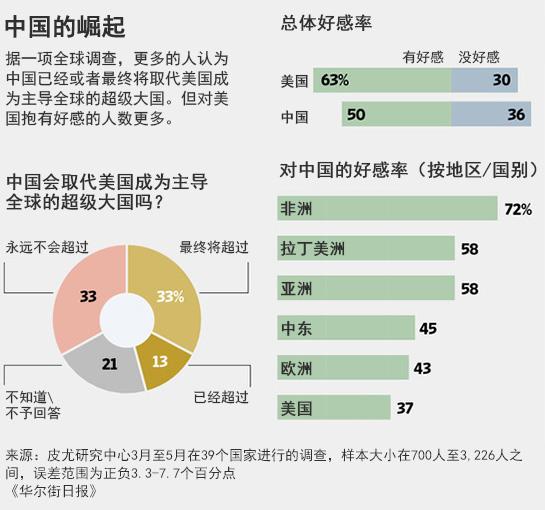民调:中国将超美国成为全球领导者国
《华尔街日报》 07/18/2013
 |
 |

最新出炉的民调结果显示,中美两国民众对对方的疑虑上升,许多其他国家的人认为美国正在将全球经济和政治权力的领导地位拱手让给中国。
据华盛顿皮尤研究中心(Pew Research Center)周四发布的对39个国家约3.8万人的调查结果显示,其中23个国家的多数受访者说,中国已经或者最终将超越美国,成为全球顶级超级大国。调查发现,中国人对于自己国家最终获得主导地位没有质疑,但美国人对这个问题意见并不统一。
皮尤研究中心的调查结果显示出,中国过去30年经济扩张对全球的影响以及2008年美国的经济滑坡正在改变围绕这两个国家的看法。中国是全球人口最多的国家,美国是全球最大的经济体。
调查报告总结称,中国的经济实力正在增强,许多人认为中国最终将取代美国成为主导全球的超级大国。

上海的浦东金融区反映了中国的经济扩张。(Reuters)
这份最新数据显示,47%的美国人认为美国将继续领先于中国,这个比例较2008年的54%有所下降。相比之下,皮尤研究中心发现,三分之二的中国人认为中国已经或者最终将超越美国,有56%的中国人认为中国应受到更大的尊重。
数据还显示出中美两国民众之间的疑虑加深。只有37%的美国人对中国有好感,只有40%的中国人对美国有好感。对这两个国家来说,对对方有好感的人数比例自2008年皮尤研究中心调查这一情况以来已有所下降。
不到三分之一的中国受访者认为中美两国的关系是合作性的,这个比例远低于此前的68%,这与中国对美国总统奥巴马(Barack Obama)的看法大幅下降的情况一致。
23%的中国受访者认为中美两国关系是敌对的。皮尤研究中心说,中国是唯一一个有超过半数(54%)的受访者对美国持负面看法的非伊斯兰国家。
不过,这项调查发现,中国需要努力提高自己的声誉。全球有63%的受访者对美国有好感。该调查发现,相比中国,美国更经常被别国认为是一个伙伴。外国受访者中只有一半对中国有好感。
中国在科学和技术等领域树立了正面的形象。在对他国的所谓的“软实力”影响则是美国普遍正面的国际形象中一个尤其重要的方面。皮尤得出结论,科技是中国最受欢迎的软实力。中国的科技在非洲和拉美产生的积极影响最大。皮尤说,约有59%的非洲人赞赏中国的商业做法。
成就不一定能令中国受欢迎。皮尤的调查显示受访者普遍厌恶中国的军事和人权政策,对其文化出口也缺乏兴趣。
不过,据皮尤说,公然的反华情绪在全球是有限的。中国最不受日本人的喜爱,只有5%的日本受访者对中国有好感,而大部分日本人对中国将成为占主导地位的超级大国表示怀疑。日本的反华情绪是由于中日领土问题造成两国关系紧张,而德国人对中国的好感也降低,尽管德国对中国出口强劲。
北京最强有力的支持者包括马来西亚、巴基斯坦、肯尼亚、塞内加尔和尼日利亚,以及委内瑞拉、巴西和智利。在亚洲、非洲和南美的一些国家,中国被认为是一个伙伴,不过对大多数国家来说,中国既不是伙伴也不是敌人。
在越来越多的地区,当地人对中国产生了类似于他们对美国的观感。比如,对于其政策给其他地方的民众带来了怎样的影响,中美都没有得到高分。
较年轻、受过更好教育的人通常对中美都更有好感。皮尤发现,未来中国最大的全球资产可能是在世界各地年轻人中的吸引力。
据被美国视为最亲密盟友的几个国家(包括英国和德国)的很多民众说,中国已经是世界头号经济大国。距离中国更近的国家(包括日本和韩国)的居民说,美国是头号经济大国;该调查发现,这些国家对中国的军事野心越来越怀疑。这项调查发现,中国的全球形象面临的一个主要挑战是,很少有国家(只有11个受访国)认为中国政府尊重本国公民的个人自由。
|
|
附:英文原文---
People in the U.S. and China view each other with increasing suspicion, and many others around the world see the U.S. losing its place to China as the leading economic and political power, a new public opinion poll shows.
According to a survey of around 38,000 people in 39 countries released on Thursday by the Washington-based Pew Research Center, majorities or pluralities in 23 of the nations surveyed said China either has replaced or eventually will oust the U.S. as the world's top superpower. The Chinese don't question their nation's eventual dominance, but Americans are split on the question, the poll found.
The Pew survey is the latest indication that the global impact of China's economic expansion over the past three decades and the 2008 U.S. economic stumble are reordering perceptions about China─the world's most populous nation─and the U.S.─its biggest economy.
'China's economic power is on the rise, and many think it will eventually supplant the United States as the world's dominant superpower,' the report concludes.
The new data show a shrinking number of Americans, 47%, believing the U.S. will continue to hold its lead over China, compared with 54% in 2008. By contrast, about two-thirds of Chinese say their country has overtaken the U.S., or eventually will, and 56% say China deserves more respect, Pew found.
The data also suggest deepening mutual suspicion. Only 37% of people in the U.S. view China favorably, similar to the 40% of Chinese who hold a positive view of the U.S. For both countries, the percentages for favorable views have declined since Pew asked the questions in 2008.
Less than a third of the Chinese surveyed described their nation's relationship with the U.S. as cooperative, down sharply from 68%, figures that hew closely to plummeting opinions in China about U.S. President Barack Obama.
Some 23% of Chinese describe the U.S. relationship as hostile. Pew said China is the only non-Islamic country where more than half the people, 54%, hold an unfavorable opinion of Americans.
Still, China has work to do on its own reputation, the survey found. The U.S. commands a 63% favorable rating around the world, and the survey found it is far more often considered by other nations as a partner compared with China, which gets a favorable rating from only half those surveyed elsewhere.
Where China holds positive images is in areas such as science and technology. Such so-called 'soft power' influences on others are a particularly strong aspect of the generally positive international image the U.S. holds. 'Science and technology are China's most popular soft power,' Pew concludes. It found the biggest positive impact across Africa and Latin America. About 59% of Africans appreciate China's business methods, Pew said.
Achievements don't necessarily make China popular. Pew detected widespread distaste for China's military and human rights policies and little interest in its cultural exports.
Still, outright anti-Chinese sentiment is limited around the world, according to Pew. The country is least popular among Japanese, 5% of whom hold a favorable view, with most doubting China will emerge the dominant superpower. While Japanese sentiment follows tension with China over territorial issues, Germans too have grown less positive about China, despite strong exports to the country.
Beijing's strongest supporters include Malaysia, Pakistan, Kenya, Senegal and Nigeria, along with Venezuela, Brazil and Chile. In pockets of Asia, Africa and South America, China is considered a partner, though to most countries China is neither a partner nor an enemy.
In more and more areas, China generates similar sentiment as the U.S. Neither gets good marks for considering how their policy affects citizens elsewhere, for example.
Younger and better-educated people tend to be more positive about both nations. 'China's greatest global asset in the future may be its appeal among young adults around the world,' Pew found.
China is already the world's leading economic power, say many citizens of nations the U.S. considers its closest allies, including both the U.K. and Germany. People living closer to China, including Japan and South Korea, say the U.S. is at the top; those nations report growing suspicion about China's military ambition. 'One of the major challenges for China's global image is that few,' only 11 countries surveyed, 'believe the Chinese government respects the personal freedoms of its people,' the survey found.

|







